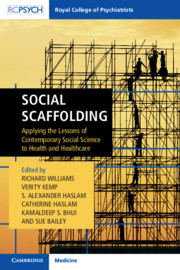Book contents
- Social Scaffolding
- Social Scaffolding
- Copyright page
- Contents
- Contributors
- Foreword
- Note
- Section 1 Schooling
- Chapter 1 Health and Society: Contributions to Improving Healthcare from the Social Sciences
- Chapter 2 Six Features of the Human Condition: The Social Causation and Social Construction of Mental Health
- Chapter 3 Social Sciences and Health: A Framework for Building and Strengthening Social Connectedness
- Chapter 4 The Social Identity Approach to Health
- Chapter 5 The Relevance of Social Science to Improving Health and Healthcare
- Section 2 Scoping
- Section 3 Sourcing
- Section 4 Scaffolding
- Section 5 Sustaining
- Index
Chapter 5 - The Relevance of Social Science to Improving Health and Healthcare
from Section 1 - Schooling
Published online by Cambridge University Press: 14 June 2019
- Social Scaffolding
- Social Scaffolding
- Copyright page
- Contents
- Contributors
- Foreword
- Note
- Section 1 Schooling
- Chapter 1 Health and Society: Contributions to Improving Healthcare from the Social Sciences
- Chapter 2 Six Features of the Human Condition: The Social Causation and Social Construction of Mental Health
- Chapter 3 Social Sciences and Health: A Framework for Building and Strengthening Social Connectedness
- Chapter 4 The Social Identity Approach to Health
- Chapter 5 The Relevance of Social Science to Improving Health and Healthcare
- Section 2 Scoping
- Section 3 Sourcing
- Section 4 Scaffolding
- Section 5 Sustaining
- Index
Summary
Reading the first part of this book presents a striking contrast between current preoccupations in healthcare systems and the science presented here. In other words, between extant public concerns about entitlement to, funding of, and delivering healthcare in the second decade of the twenty-first century and the contents of Chapters 2, 3 and 4.
Healthcare systems and the people who fund, run and deliver them are, arguably, necessarily acutely sensitive to the socio-economic environment in which countries sit. The potential capabilities of healthcare continue to develop at increasingly rapid rates. By contrast, we live in a world in which the resources available are affected by austerity and in which the spread of affluence between the most advantaged people and the least affluent continues to grow. This is contributing to an increasing gap between potential capability and actual capacity, which appears to be expanding rapidly.
- Type
- Chapter
- Information
- Social ScaffoldingApplying the Lessons of Contemporary Social Science to Health and Healthcare, pp. 40 - 42Publisher: Cambridge University PressPrint publication year: 2019



